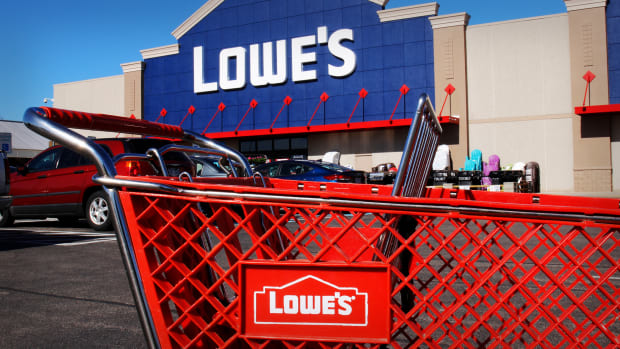The big-box home improvement stores crushed a lot of local hardware stores in the same way Starbucks (SBUX) devastated local coffee shops. Lowe's (LOW) and Home Depot (HD) offer a stunning selection -- literal football field-sized shopping areas which have nearly anything a contractor, homeowner, or a do-it-yourselfer could want.
And while many businesses struggled during the pandemic, the two big home improvement chains benefited from everyone being stuck at home. That led to a lot of projects, from house painting to additions, remodels, and lots of appliances being replaced.
Over the past five years, both chains have seen their stock prices climb by roughly 150%. That makes sense given their dominance and the growth in the market of people looking to build or improve homes.
Nothing should change about that market, although inflation could delay some plans, repairs, and projects. Many home improvement projects, however, have to happen at some point and can only be delayed so long. Both of these companies will likely see their sales rise, albeit maybe not in a straight line, but there's a key reason I don't own shares and probably never will.

Shutterstock
Lowe's and Home Depot Have One Big Problem
Lowe's and Home Depot both serve contractors (people who ostensibly know what they're doing and what they need) and people (like me) who most certainly do not. Visiting either of these chains can be a very frustrating experience and both score below average in their category in the annual American Customer Satisfaction Index (ACSI).
Home Depot scored a 76 and Lowe's a 75 on the 100-point scale, with Nike topping the specialty retail category with an 81 and Office Depot taking up the basement with a 72. Those scores, however, come from all Home Depot and Lowe's customers and the experience for a homeowner who knows relatively little about home improvement is very different than what a contractor experiences.
Both Lowe's and Home Depot make it very difficult to do business with them. Getting help can be a challenge and even when you find someone who might help you, they're often unwilling to help or generally unhappy at having to. Both chains have permanent staff in specialty areas like paint or kitchen design, but finding someone to answer a question on the floor can be a lonely problem.
Neither chain seems to actually embrace customers who don't know what they're doing. That may not be a huge percentage of the audience (and I'm more incompetent when it comes to home improvement than most) but I don't invest in companies that don't treat me well.
And, while I have had multiple bad experiences at Lowe's recently, this isn't a recent problem but an endemic one. Neither Lowe's nor Home Depot has a minimum wage of $15 per hour. Given that so many of their competitors do, it's hard to imagine that either chain attracts the best talent.
What Can Home Depot and Lowe's Do?
Both chains have leaned into their joint monopoly status. I may not want to invest in either but I have to shop at one or the other for most of my home improvement needs. Yes, there are local hardware stores (and we bought paint for our current house project from one of those) but Lowe's and Home Depot have much broader selections.
If either chain embraced customer service -- starting with paying its workers higher rates -- it could separate from its rival. I'd literally pay extra to have a caring, non-condescending worker help me as I flail about the store trying to figure out what I actually need.
At worst, either chain could embrace the idea of providing customer service on demand. That could mean better staffing or simply having a central place in each store where help can be found that can then venture into the store with you.
Both of these chains are doing well, but sales success has masked their problems. Home Depot and Lowe's need to embrace customer service beyond their contractor base. If one did that, it would have a huge advantage over its rival and shore up a core weakness that likely costs both chains sales to Amazon and other rivals.







